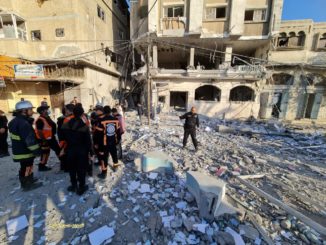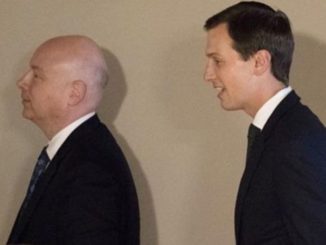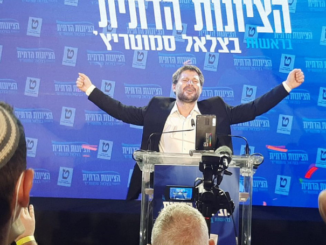
By Benay Blend
If voters in America had the benefit of political education, the kind that Lectores de Tabaqueres provided at the turn of the century to cigar factory workers in cities like Tampa Florida, would they have made the same choices at the primary polls last night?
From around 1900 to the 1930s, these men informed workers with selections from Zola, Victor Hugo, and Karl Marx, a tradition that continued until “rollers and readers” were replaced by mechanization.
In Gaza, this tradition reappeared during the early days of the Great Return March when participants organized a series of “reading chains” where people read and discussed such issues as colonialism and imperialism.
As Fadi O. Al-Naji explains, these events are meant to educate young people raised under occupation about the forces that that impact their lives while giving them a space to discuss strategies of resistance.
There is a long history of community organizing in both Palestine and the United States. Made possible by what Mason Herson-Hord calls the “solidarity economy,” the student movement, the labor movement and the women’s movement in Palestine created mutual aid networks across occupied Palestine. Working together, these groups provided the backbone of what would become the Intifada of 1978.
In America, Black mutual aid societies go back to the 18th century when strategies of racial solidarity and self-help spawned organizations to provide legal aid in the black community. After the Civil War organizations such as National Ex-Slave Mutual Relief, Bounty, and Pension Association provided mutual aid for its members and fought to pass federal pension legislation that would compensate all ex-slaves.
In the late 1960s and early 70s, the Black Panther Party (BPP) carried on this tradition with projects like its Free Breakfast Program for Children. As Eldridge Cleaver wrote in 2006:
“Breakfast for Children pulls people out of the system and organizes them into an alternative. Black children who go to school hungry each morning have been organized into their poverty, and the Panther program liberates them, frees them from that aspect of poverty. This is liberation in practice.”
This strategy–“organizing oppositional community institutions from below to meet human needs, fight back and build a new society in the shell of old”—continues today, Herson-Hord explains, not only in Palestine but also in other countries where neighborhood assemblies facilitate self-governing as well as popular resistance movements.
Many years after the Intifada, concludes Herson-Hord, lessons learned from that struggle are still important, especially “the simple power of a neighborhood council.”
Local response to the coronavirus provides a contemporary example of people moving to save themselves rather than waiting for government assistance that might-or might not-be forthcoming. In response to the health crisis, Palestinian activist Iyad Burnat summarized a meeting of representatives from the village of Bil’in which met to discuss ways to protect their families.
The goals, Burnat explained, would be possible based on “individual and collective responsibility,” the latter a hallmark of Palestinian society.
In Albuquerque, New Mexico, the Red Nation is calling on community members to meet on March 15, 2020, at the Larry Casuse Freedom Center to discuss how to develop precautionary plans. “This will enable us to work towards community action,” event organizers explained, “ensuring that the people, organizations, hospitals, tribal nations, and local governments are prepared for this serious situation.”
These narratives will be lost without what All African People’s Revolutionary Party organizer Onyesonwu Chatoyer calls “long term political education work.” In a similar vein, assassinated Black Panther Party (BPP) leader Fred Hampton asserted that “with no education, you have neocolonialism instead of colonialism,” every much like in Africa and Haiti.
Before becoming a member of the BPP, every person had to go through a six-week course of political education. If poor people aren’t educated, he concluded, “they’ll want more, and before you know it, they’ll be capitalist,” and “before you know it, we’d have Negro imperialists,” which is pretty much the situation now.
In an article entitled “The Need for a Palestinian History from Below,” activist and writer Ramzy Baroud voices a similar note. “Palestine is not a story of factions,” Baroud explains, but rather a “history of colonialism and resistance,” a “history from below” that appeals to the “average Palestinian citizen.” Like Chatoyer’s appeal for the integration of political education into activist agendas, Baroud explains that
“it is incumbent upon us – not only Palestinians but those who wish to present a truthful understanding of our historic struggle – to reclaim the Palestinian narrative and dislocate the propaganda-driven Zionist one. The story must now focus wholly on the lives, perspectives and representations of ordinary people – refugees, poor, underclass and working-class Palestinians. It is they who truly epitomize Palestine, not Abbas and his imaginary peace process.”
For “one bright shining moment,” (alluding to the documentary about the late Senator George McGovern, who experienced the same manipulation of the voting process as Sanders seems to be enduring), it seemed that Bernie Sanders might have had a chance to turn this country around, albeit not with a socialist agenda.
As Chatoyer expounds, an “entire bourgeois media and political apparatus was deployed” against Senator Sanders, while voters, lacking a historical perspective, and others in the race, lacking any other perspective except “electability,” fell right in line.
Indeed, as Lana Tatour explains, in Israel, too, “it is time to forgo the illusion of inclusion and to mobilize around a radical project of decolonization.”
The road to liberation, she continues, does not rest in the political system; the “obstacles” to “gaining power” are “structural, rooted in the foundations of the Israeli state itself. Israel is a racist, settler-colonial state, and its architecture and legal infrastructure are premised on maintaining a racial distinction and hierarchy between Jews and Palestinians.”
Change the players, and the same is true for the United States. “Every single thing the Sanders campaign promised is possible,” Chatoyer claims, “-and much, much more – but it cannot be won through an electoral process that is controlled by and exists to maintain the power of the ruling class and the system of capitalism.”
The answer, she concludes, rests “in uncompromising solidarity with the working class colonized masses of the world.”
Along those lines, Tatour quotes the late write, Audre Lorde:
“’The master’s tools will never dismantle the master’s house.’ Sometimes we have to use the master’s tools, but we should not stake our struggle on them.”
When we understand that point, through community organizing, long-term political education, and confidence in our own abilities to create change, then what Sanders promised, and more, will not only be possible but attained.
– Benay Blend earned her doctorate in American Studies from the University of New Mexico. Her scholarly works include Douglas Vakoch and Sam Mickey, Eds. (2017), “’Neither Homeland Nor Exile are Words’: ‘Situated Knowledge’ in the Works of Palestinian and Native American Writers”. She contributed this article to The Palestine Chronicle.

– Benay Blend earned her doctorate in American Studies from the University of New Mexico. Her scholarly works include Douglas Vakoch and Sam Mickey, Eds. (2017), “’Neither Homeland Nor Exile are Words’: ‘Situated Knowledge’ in the Works of Palestinian and Native American Writers”. She contributed this article to The Palestine Chronicle.








“The road to liberation, she continues, does not rest in the political system; the “obstacles” to “gaining power” are “structural, rooted in the foundations of the Israeli state itself. Israel is a racist, settler-colonial state, and its architecture and legal infrastructure are premised on maintaining a racial distinction and hierarchy between Jews and Palestinians.”
If not intentional there still can be hope, when maybe there is a change of hands. I believe that the physical truth could still be far from the real and natural truth. And Israel should be able to recognize it’s flaws. That is my firm believe.